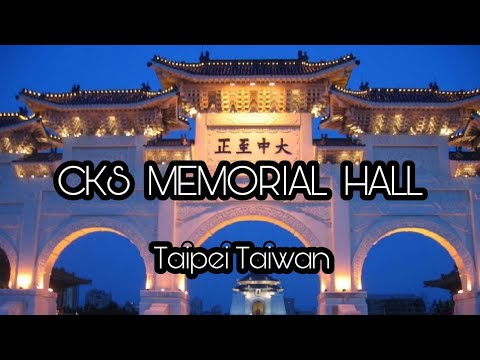CKS Memorial Hall Taiwan.By Moreways Tourism.

Historical Course of Change and Development In 1975, after the passing of President Chiang Kai-shek, the Executive Yuan established a preparatory team to promote construction of the Chiang Kai-shek Memorial Hall, which was completed in 1980. The park includes the Liberty Square Archway, Main Plaza, Hall, National Theater, National Concert Hall,corner cloister pavilions, and so on. Taiwan’s democratic transition occurred in the 1990s. President Chiang Kai-shek was the national leader during an authoritarian period when many human rights violations such as the “White Terror” occurred, and the debate over his historical merits and demerits has caused fierce controversy.
In 2007, the name “Chiang Kai-shek Memorial Hall was changed to “National Taiwan Democracy Memorial Hall,” and the characters “Impartial and Righteous” cast on the Archway were changed to “Liberty Square.” In 2008, the exhibition “Door Opens to Democracy, Wind of Freedom Blows” was held, with deconstruction of the authoritarian space as theme. Although in 2009 the Hall reverted to its original name, it has remained a place dedicated to the struggle against authoritarianism. In 2017, the Legislative Yuan passed “The Act on Promoting Transitional Justice,” which stipulates that symbols of authoritarianism must be removed, renamed, or otherwise dealt with in order to ensure liberal democratic constitutional order, and to remember the historical lesson of human rights violation events, entering Chiang Kai-shek Memorial Hall into a stage of transformation.
Multiple Democratic Movements In 1998, after the lifting of martial law and with Taiwan’s democratic transformation, the Chiang Kai-Shek Memorial Hall’s Main Plaza and its surrounding space became a place for protesters to gather, as part of movements such as the “Tiananmen Square protests” in 1989, Wild Lily student movement in 1990, Anti-Nuclear March in 1994, Wild Strawberries Movement in 2008, memorial marking the 50th anniversary of the Tibetan Uprising in 2009, Symbiosis Music Festival commemorating the 2/28 incident in 2013, Sunflower Student Movement in 2014, Marriage Equality "Rainbow Event" in 2014, aboriginal smoke signal ceremony seeking self-determination in 2015, support for the Anti-Extradition Movement anniversary protests in Hong Kong in 2020, etc. The Hall is a venue for witnessing Taiwan’s democratic transformation and diversity of values. Art and Cultural Events Hundreds of cultural-arts exhibitions and performances are hosted in the Chiang Kai-shek Memorial Hall every year, including exhibitions of paintings, photography, calligraphy, engravings, sculptures, and mixed-media art, along with performing arts shows. Examples include “The Power of Vision: The Aboriginal’s Music and Dance,” “The History of Ukiyo-e,” “ Tutankhamun: The Golden Pharaoh,”, etc.
The richness and diversity of its cultural-arts events has made the CKSMH a significant venue for art exhibitions and cultural performances in Taiwan. As an important historical venue for witnessing the democratic development of Taiwan, the CKSMH has actively organized exhibitions to advance reflection and speculation concerning human rights, for example “Daylight Breaking: A Retrospective of Taiwan’s Democratic Developments, 1987-1996,” “Return to the Square: Special Exhibition for the 30th anniversary of the 1989 Tiananmen Square Massacre,” “Awakening Tide: The Call for Freedom on the Long Road to Democracy,”etc., continually promoting the universal values of liberal democracy and human rights. Education and Leisure Activities The CKSMH meticulously plans nearly a thousand extension education sessions and study activities annually and hosts an irregular schedule of various cultural seminars and public welfare speeches to provide self-learning opportunities for all age groups. The natural and cultural resources of the CKSMH make it an excellent place for field trips by Taipei Metro Area elementary and middle schools.
It received Environmental Educational Facility certification in February 2017, and hosts a cultural preservation and nature conservation curriculum, such as “Day Trip to CKSMH” excursions, to actively promote environmental education.In addition, courses on transitional justice and human rights topics are continuously opened, popularizing and strengthening democratic concepts. The park covers 25 hectares, with lush grassy areas and luxuriant trees and flowers, providing ever-changing charms throughout the seasons. There is a variety of garden landscaping, ponds, and bird, fish, and insect eco-abundance in the park,making it a fine place for the public to come play Chinese chess, exercise, and stroll, getting close to nature and enjoying cultural sightseeing.
2022-07-20 14:22


